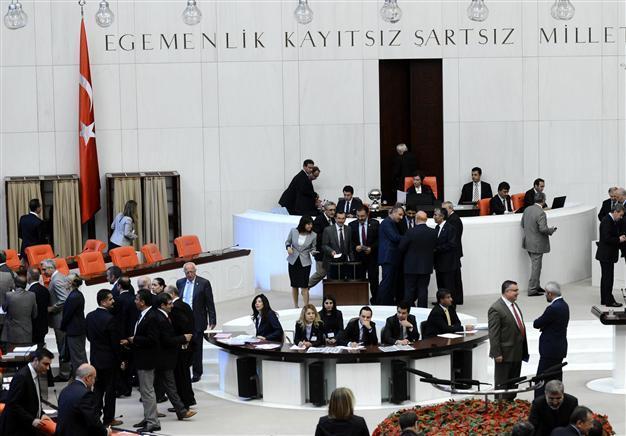Turkish Parliament adopts alcohol restrictions, bans sale between 10 pm and 6 am
ANKARA

AA Photo
Parliament’s General Assembly has adopted a highly controversial alcohol bill proposed by the ruling Justice and Development Party (AKP), tightening restrictions on the sale and advertising of alcoholic beverages, despite strong objections against the bill on the grounds of personal freedom and respect for lifestyle choices.The proposal was swiftly put on the agenda, despite the protests from the opposition, and was eventually adopted early in the morning of May 24 following debates which ran on past midnight. The AKP has acted remarkably fast in bringing the legislative package to the agenda of Parliament’s General Assembly, within a period of a mere two days.
According to the bill, retailers will no longer be allowed to sell alcoholic beverages between 10 p.m. and 6 a.m. The opposition parties strongly criticized the amendments, arguing that such a ban should not include touristic regions. “[Alcohol] banned during night prayers, but allowed during morning prayers,” a Peace and Democracy Party (BDP) deputy said about the proposition.
The head of the Planning and Budget Commission, Lütfü Elvan of the AKP, said that such restrictions were in place in many Western countries. “This approach of night prayers and morning prayers saddened me. In Sweden, [the retail sale of alcohol] is forbidden after 7 p.m. on weekdays, 3 p.m. on Saturdays and 24 hours on Sundays. There are similar restrictions in all Scandinavian countries,” he said.
“No one can be forced to drink or not to drink. This is a religious and ideological imposition,” Musa Çam, a deputy from the main opposition Republican People’s Party (CHP) said. “This is not a struggle against the ills of alcohol but an attempt to re-design the society according to their beliefs and lifestyle,” he added.
All sorts of advertising campaigns will be completely banned, such as promotions, sponsored activities, festivals and free giveaways. The only exception will be the international fairs aimed at international marketing of the alcoholic beverages.
Violators of the advertising ban will be punished with financial penalties ranging from 5000 to 200,000 Turkish liras.
Under the bill, alcohol companies would no longer be allowed to promote their brands and logos, these can only be used as part of service inside the facility.
Additionally, all liquor bottles sold would have to display warning signs about the harms of alcohol, again similar to those found on cigarette packages.
London-based spirits company Diageo, which entered the Turkish market by acquiring Mey Icki in 2011, released a statement on May 23, saying that it shared the government’s concerns about alcohol consumption but that it was seeking a meeting with officials to “present alternative views” on “fair, balanced and responsible” regulation.
In TV series, films and music videos, images that glorify the consumption of alcohol will be prohibited. Images of alcohol would be blurred, the same way as cigarettes are being blurred at the moment.
BDP deputy Murat Bozlak also demonstrated their disapproval of the bill as he said “Nobody has the right to impose the monotype lifestyle on the society.”
Alcoholic beverages will not be allowed to be purchased from vending machines. Beverages could not be sold from see-through shop windows and cannot be sold to be consumed outside the facility.
Student dormitories, health institutions, sports clubs, all sorts of education institutions and gas stations will be banned from selling alcohol. Already acquired licenses to sell alcohol will remain intact, yet to get new ones, facilities are required to be located outside the perimeter of 100 meters of educational and religious centers.
Those who want to get licenses to sell alcohol from the Tobacco and Alcohol Market Regulatory Authority (TAPDK) will be conditioned to get the license to open up a business from the municipality and then a tourism document from the Ministry of Culture and Tourism. Before granting a license the municipalities will get the opinion of the authorized law enforcement forces.
The alcohol limit for drivers has also been decreased from 1 to 0.5 promil. If the driver is to exceed this limit, they will be penalized with a fine of 700 liras and their driving license will be seized for a period of six months. Smoking while driving is also prohibited.
















